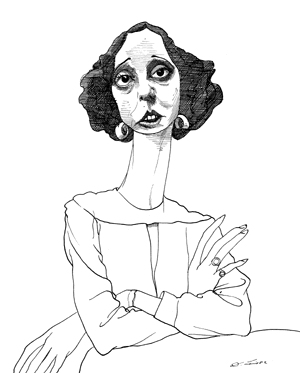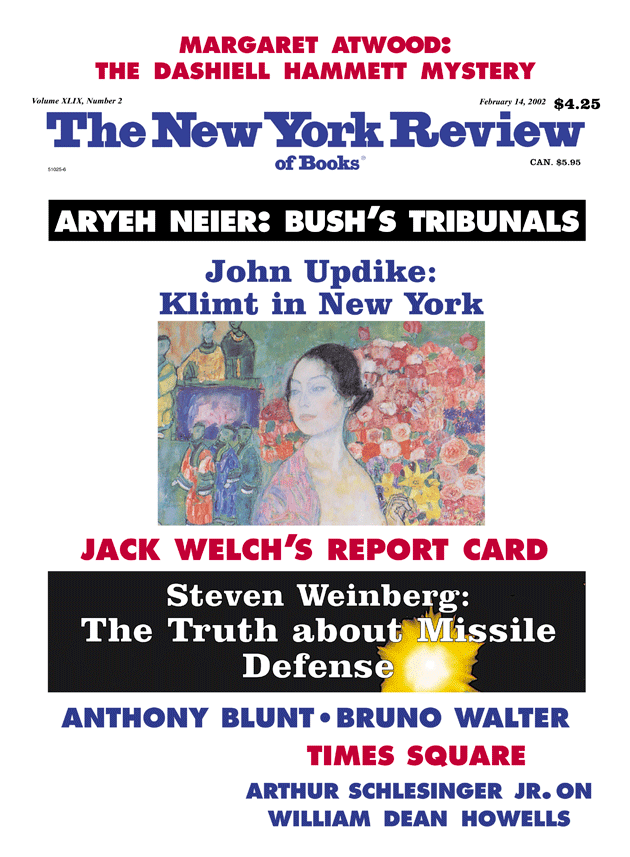“Lurid and melodramatic” is how D.H. Lawrence described Poe’s The Fall of the House of Usher. “Lurid and melodramatic” is the perfect description for Beasts too; but the real reason the quote is irresistible is that Joyce Carol Oates’s new novella itself is so thickly studded with quotes from D.H. Lawrence. You could call it a ghoulish variation on a Lawrentian theme.
Most of the quotations fall from the lips of Andre Harrow, a charismatic professor of English literature (though, typically, he scorns to use the title). He teaches at Catamount, a classy women’s college in the Berkshires. The milieu and the cast are not unlike those in some of Oates’s earlier novels, just a little bit older in age and sophistication and a little bit up in social class from the high schools in Foxfire and Broke Heart Blues. Only the best students in the Catamount English department are allowed to join Harrow’s elite poetry workshop. He criticizes their poems and recites to them passages “from Blake, Shelley, Whitman, Yeats, and Lawrence, with such fervor you understood that poetry was worth dying for. (Yet Mr. Harrow wasn’t a poet himself, it seemed. We wondered why.)” The bit in parentheses is typical of Oates’s poker-faced irony—the salt that makes swallowing her lavish helpings of lurid melodrama so enjoyable.
Harrow’s choice of writers is meant to tell you something about him, and it does. “Lawrence,” he proclaims to the mostly doting members of his audience, “teaches us that love—sensual, sexual, physical love—is the reason we exist. He detested ‘dutiful’ love—for parents, family, country, God. He was in fact a deeply religious man but he celebrated, not a dead God, but a living Eros.” Harrow might have quoted (but doesn’t in fact) from The White Peacock: “Be a good animal, true to your animal instincts.” He and his wife, Dorcas, live—as far as is possible in their position—according to this precept, which Dorcas puts more brutally. She is a sculptress, and when she has an exhibition at the college art museum, she affixes the following slogan to one of the walls: “WE ARE BEASTS AND THIS IS OUR CONSOLATION.”
Beasts is a thriller, so it wouldn’t be right to tell the plot in detail, but it is more horrific than Oates’s previous tales of adolescent hysteria and campus crime. It’s about sadomasochism, a topic which grows an extra dimension of horror, creepiness, and fascination when it is set in an ultra-respectable environment instead of a brothel; and Oates has made the very most of that fact. The names she gives her characters always tell you a lot about their backgrounds, and the Catamount girls’ parents are obviously a refined, ambitious bunch to have chosen Cassandra, Sybil, Penelope, Marisa, and Dominique. The narrator/heroine is called Gillian, a humbler choice, though genteel enough; but then, heroines are often Cinderellas under another name. Gillian is a sort of Cinderella too, with Dorcas as the wicked godmother. Of course the wicked godmother and her consort are defeated, but in an unpredictably final and gruesome way by an unforeseeable agent.
Dorcas is a bit older than her husband, more forceful, and even sexier. Her behavior is conventionally unconventional, and so are her clothes (fringes and sandals). She is part French, part Greek, part Hungarian, and speaks in Franglais. This gives an inappropriately quaint and winsome touch to her personality and is a very clever touch of Oates’s. Dorcas’s sculpture is pseudo-primitive (based on aboriginal totem figures), and sexy to the point of shocking; so shocking that her exhibition causes outrage and protests, especially from those whom Gillian calls the “alums”: they write furious letters to the progressive head of the college. Lawrence would surely have appreciated Dorcas’s creations, but even some of the students don’t, and one of them defaces a “squatting birth figure” with “BULLSHIT” written in red nail polish across its belly. Dorcas refuses to have the graffito removed. “I love insult, it’s always honest.” The Harrows are given to speaking in maxims.
For instance: “‘A journal is an ax for the frozen sea within’—so Mr. Harrow paraphrased Kafka.” He sets the poetry workshop girls to write their own journals and read them out loud. “They described lurid, violent sexual fantasies and sexual acts. They outdid one another describing menstruation.” When Harrow is especially impressed, his praise goes over the top: “This is the material of nightmare, therefore the material of potentially great art.” The girl to get this accolade is Gillian’s elegant buddy Dominique. Dominique’s diary speaks of sexual abuse by her father, but also reveals that some of her Barbadoan ancestry was “brown.” Political correctness is mocked at several removes when Dominique annoys Gillian by talking to her in a “mock-Negroid accent” and neglecting her in favor of a group of black girls.
Advertisement
She is angry because Gillian has supplanted her as the third member of the Harrows’ rollover sadomasochistic ménage à trois. Several other girls have already been through this experience (which in Gillian’s case is described in not just lurid but luscious detail). It is apt to bring on nervous breakdowns of various kinds. Gillian’s own psychological damage turns out fatal, not for her, but for the Harrows: she kills them. Unlike the other girls, she gets over her derangement.
The book has a prologue and epilogue set in Paris in February 2001, twenty-five years after the events of the main story. Gillian and Dominique are there together. By that time “Dominique was a choreographer for the Alvin Ailey Dance Theater where she’d been a dancer through her twenties; I was provost of a small, but distinguished, liberal arts college in suburban Philadelphia. We often traveled together, though we lived apart.”
That’s from the epilogue. The prologue is more puzzling. Alone in the Louvre, Gillian comes across an aboriginal totem sculpture from British Columbia. It’s a naked woman suckling a baby, but the baby is just a head. Dorcas’s suckling babies were just heads too. The sight of this one almost causes Gillian to faint, but she pulls herself together, smiles “my bright American smile like neon flashing,” and addresses the reader:
I was forty-four years old. A quarter-century had passed.
This is not a confession. You will see, I have nothing to confess.
That’s the last sentence of the prologue and therefore the launchpad of the story. It is mysterious and wickedly misleading, because Gillian does have something terrible to confess, and Oates will describe it in gruesome slow-motion detail. Gillian learned something from the Harrows: they never felt guilt, and she doesn’t either.
Beasts is something of a jeu d’esprit noir. It resembles Dorcas’s famous cassoulet made with duck and sausage and red wine: delicious but heavy, and not digestible in large quantities; which is why the novella length is exactly right for it.
This Issue
February 14, 2002



